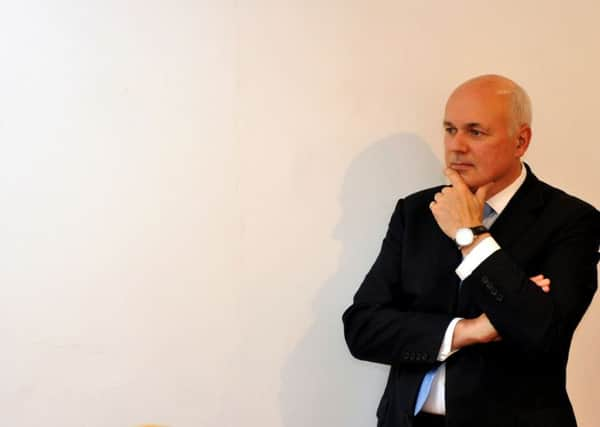Tom Richmond: The IDS resignation '“ and why George Osborne is now unfit to govern


This is abundantly clear from a brutally blunt resignation letter, and even more forthright interview, in which the now former Work and Pensions Secretary accused Mr Osborne of penalising the poor, and disabled, because of an inability to meet economic growth forecasts. It’s that significant.
Potentially the most incendiary Tory resignation since Sir Geoffrey Howe brought down Margaret Thatcher in 1990, this has nothing to do with European Union referendum turmoil. Quite the opposite. If it was, the former Tory leader would not have held back in his damning letter – or he would have walked out of the Cabinet when David Cameron returned from Brussels with such a half-hearted renegotiation.
Advertisement
Hide AdAdvertisement
Hide AdGovernment ministers also have the freedom to speak out on Europe now the referendum campaign is underway, further evidence that Mr Duncan Smith had reached the end of his tether after describing his own position in Government as being “semi-detached”.
Context is critical. Mr Duncan Smith has no leadership ambitions (unlike Boris Johnson). He was not cut out to be leader when he succeeded William Hague in 2001 and only began his social justice crusade after being ousted by his own MPs.
Since that low point, he has become a passionate advocate for the impoverished and became one of the great reforming Work and Pensions Secretaries in 2010 when he took on the challenge of ending the corrosive (and costly) culture of worklessness amongst the poor which had become endemic.
However his attempts to make it easier for the unemployed to make the transition into employment repeatedly came under attack from the Treasury – the Chancellor’s aides even questioned Mr Duncan Smith’s intellect. How schoolboyish.
Advertisement
Hide AdAdvertisement
Hide AdThe turning point came at last year’s elections when the Lib Dems, Tory coalition colleagues from 2010-15, were annihilated. It was their Ministers who stood up for Mr Duncan Smith in Cabinet against the Chancellor.
Devoid of this cover, the Work and Pensions Secretary was exposed and these simmering tensions with Mr Osborne reached boiling point over personal independence payments (PIP) and whether a further £1.4bn of savings could be squeezed out of a budget which supports people with disabilities.
By all accounts, Mr Duncan Smith wanted time to consult on best practice – there is doubt, for example, whether beds should be funded by the Welfare State
if recipients have to sit down to put on their socks – but the control-freak Chancellor became impatient before last Wednesday’s Budget.
Advertisement
Hide AdAdvertisement
Hide AdThis pre-emptive strike triggered Mr Duncan Smith’s “Dear colleague, it’s not what it sounds like in the Budget” letter before the Treasury started blaming the Work and Pensions Secretary for the fiasco as a Tory rebellion grew. No wonder, he chose not to defend the indefensible after being asked to make one compromise too many.
Never before has a senior Minister felt the need to resign within 48 hours of a Budget – and it should not be forgotten that Mr Duncan Smith was, in fact, the Chancellor’s biggest Commons cheerleader as recently as last summer’s post-election financial statement when he lauded the latest round the cuts.
What changed? After cutting working-age benefits by £33bn a year, Mr Duncan Smith – a proverbial Marmite politician regarded by his own party as either a saint or a sinner – believes he can only do so much.
He talks about “policy changing by the hour” and that “this is not the way to do government”. Both charges are damning of the Prime Minister and Chancellor’s increasingly cosmetic leadership and the “salami-slicing” of welfare-to-work policies.
Advertisement
Hide AdAdvertisement
Hide AdHe questions why the working age and poor should have to pay for tax breaks for the wealthier when so many ring-fenced Government budgets - like overseas aid and the UK’s financial contributions to the EU – are untouchable.
And then there is this devastating charge: “I am unable to watch passively whilst certain policies are enacted in order to meet the fiscal self-imposed restraints that I believe are more and more perceived as deeply political rather than in the national economist interest.”
No guesses for identifying the target? In short this is a senior politician claiming that Mr Osborne will only achieve his much-promised Budget surplus by 2020 on the back of further welfare cuts – and that the Tories risk deep divisions in society if they continue to ignore the poor simply because the impoverished don’t vote Conservative.
With the Chancellor’s missed economic targets growing by the day, and his duplicity over flooding funding for example, the ex-Work and Pensions Secretary is effectively suggesting that Mr Osborne is unfit to hold high office because his “we are all in this together” mantra has become so lop-sided.
Advertisement
Hide AdAdvertisement
Hide AdFor this, the country should be grateful that Mr Duncan Smith – the former “quiet man” of politics and renowned right-winger – has found his voice and put his One Nation values before his party and chosen to lead the charge from outside the Cabinet.
If only the same could be said for George Osborne, the man who wants to be Prime Minister, the man who is pulling the strings in David Cameron’s divisive government and the man whose Chancellorship is under attack on all sides for a lack of compassion.
Would you want him leading the country after this? I wouldn’t. Nor, I suggest, does Iain Duncan Smith.